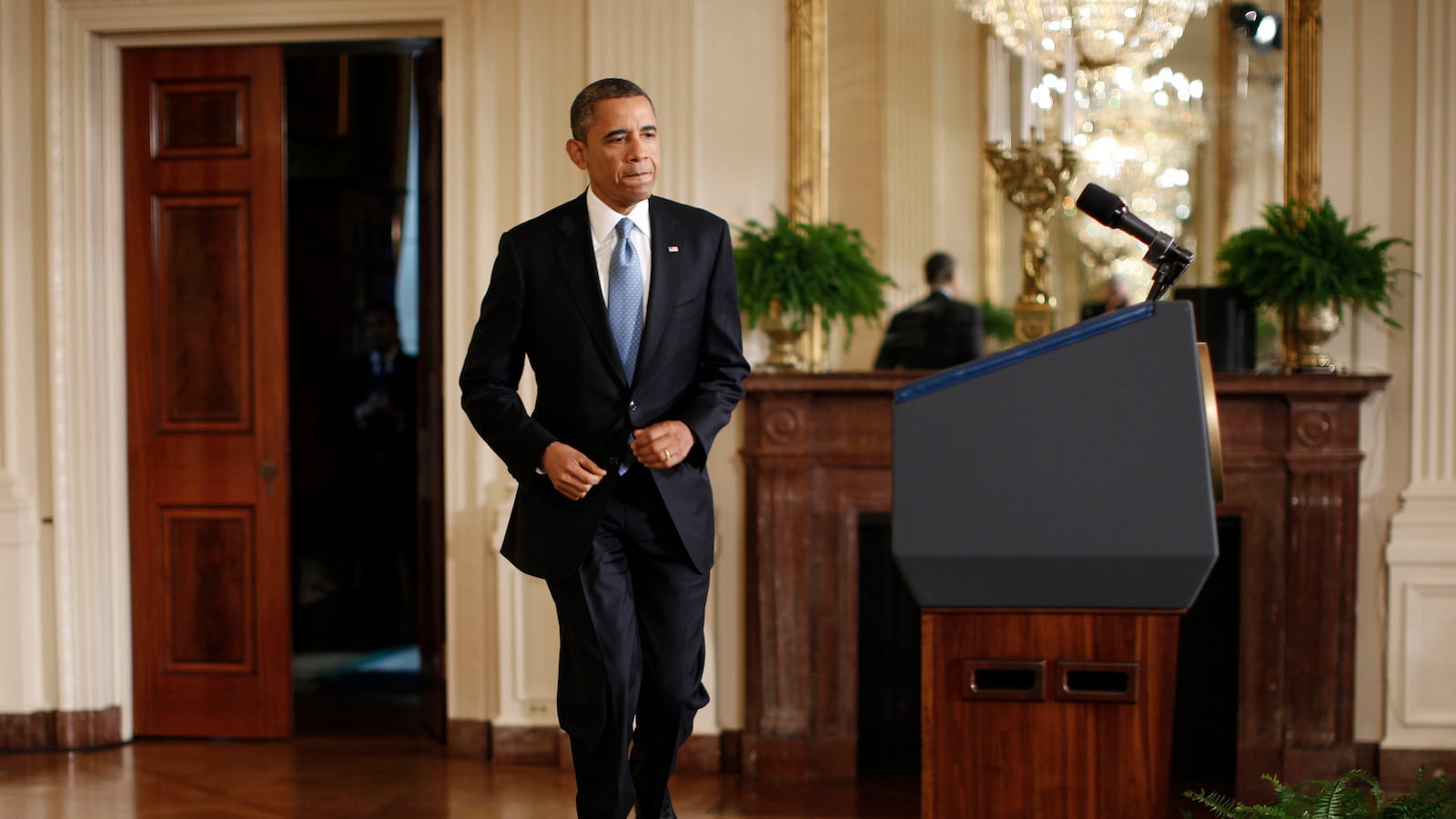Every inaugural address is part Hallmark card to America: liberty, greatness, unity, democracy, yadda yadda. What people remember (when they do, which is rare) are the phrases that capture the national mood at a particular moment in time. Those phrases stand apart from the enduring clichés that every president summons every four years. And they involve some kind of argument, even a rebuke. Inaugural addresses are not convention acceptance speeches. You can’t skewer your foes. But in defining the moment, you must also define them. If your political opponents don’t wince once or twice—or if the guy you beat could have given essentially the same speech—you’ve failed.
When Franklin Roosevelt in 1933 declared that “I shall ask the Congress for the one remaining instrument to meet the crisis—broad Executive power to wage a war against the emergency, as great as the power that would be given to me if we were in fact invaded by a foreign foe,” he was rebuking those conservatives who believed that America’s prosperity and liberty required shackling federal power. When John F. Kennedy said, “Let every nation know, whether it wishes us well or ill, that we shall pay any price, bear any burden, meet any hardship, support any friend, oppose any foe, in order to assure the survival and the success of liberty,” he was rebuking his predecessor, Dwight Eisenhower, whose foreign policy Kennedy considered passive and timid. As it would turn out, Eisenhower’s refusal to “pay any price, bear any burden,” reflected a wiser understanding of both economics and war. But in 1961 Americans liked Kennedy’s ambition.

In 1981 Ronald Reagan took direct aim at America’s expanded welfare and regulatory state and declared that “in this present crisis, government is not the solution to our problem; government is the problem.” It might as well as have been his campaign bumper sticker.
Obama sees himself as the Democratic Reagan, the guy who changes the terms of national debate and ushers in a generation of one-party dominance. So in 2009, in the key phrase of his first inaugural address, he tried to answer the Gipper. “The stale political arguments that have consumed us for so long no longer apply,” he declared. “The question we ask today is not whether our government is too big or too small but whether it works.”
The statement fit Obama’s recently completed campaign, in which he harnessed a conventional liberal agenda to the promise that he could move America beyond the partisan blood feuds of the baby-boom generation. But ultimately, Obama’s money quote was both arrogant and condescending. It was arrogant because it reflected Obama’s belief that the financial crisis had made the necessity of government action self-evident. The only question now was how to structure that action. But for many Republicans, the financial crisis had proved no such thing: they truly believed that it was the result not of insufficient government oversight of the financial markets, but of excessive government meddling in the housing markets. Obama didn’t enter that argument; he breezed by it. Secondly, he assumed, patronizingly, that what really bothers conservatives about government is its inefficiency. Thus, once the Washington bureaucracy was fine-tuned by a president dedicated to making sure it “works,” conservatives would lay down their pitchforks.
But had Obama listened more carefully to Reagan’s first inaugural address he would have realized that the Gipper’s real objection to big government wasn’t that it doesn’t work; it was that it threatens liberty. By not taking that objection seriously, and thus not connecting his argument about government action to an argument about freedom, Obama left himself vulnerable to the Tea Party revolt.
Now Obama has a chance to remedy his mistake. In his second inaugural, he must finally make the case for government. He needs to explicitly challenge the GOP’s claim that any expansion of government power—whether to expand health-care coverage or limit carbon emissions or ban assault weapons—eats away at the individual freedoms that make America America. He needs to attack the right’s paranoia about government. He needs to reject the right’s claim that being an “exceptional” nation requires America to ignore what works in other nations. He needs, most of all, to challenge the right’s penchant for talking about American government as “they” rather than “us,” its habit of speaking about American government as if America were a despotism and not a democracy.
Finally, Obama should argue that for government to really work, America must become more of a democracy. He should detail the way in which the influence of concentrated wealth undermines the influence of ordinary people. He should call out the right for talking about government as if it were irresponsive and predatory, and then perpetuating a system of special-interest power that makes it irresponsive and predatory.
Obama will not win every skirmish with the Republican Congress in his second term. But to achieve his goal of being a transformational president, he must decisively win the overarching struggle over whether post–financial crisis America requires more government or less. His second inaugural will be judged on how well he defines the terms of that debate.






